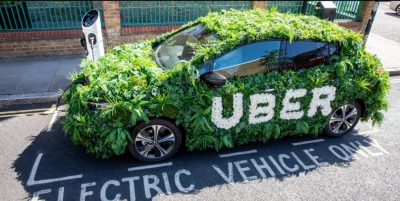
Photo: Uber Green Image Uber
Uber to expand ‘Green’ service across North America
29 January 2021
by Christopher Carey
Uber is set to expand its Uber Green service across 1,400 new North American towns and cities, including Austin, Calgary, Houston, Miami, New York City, Tucson, Winnipeg and Washington, D.C., providing passengers with the option to select a journey using electric or hybrid cars.
Passengers who opt for Uber Green will incur a US$1 surcharge, half of which will go to the driver to support their use of a hybrid or electric vehicle, according to Uber.
The other half will go towards Uber’s Green Future Campaign, which the company says will enable hundreds of thousands of other drivers to transition to battery electric vehicles by 2025.
The feature will also be rolled into the Uber Pass membership service, offering those riders 10 percent off green trips.
“This 2025 commitment is part of our longer-term strategy to go 100 percent electric in all major cities in the US, Canada and Europe by 2030, and 100 percent electric in all cities around the world by 2040,” said Uber CEO, Dara Khosrowshahi.
Electric pledge
Uber has also revealed new partnerships with companies as part of the aim to get more of its drivers into less polluting vehicles, including:
- Avis EV rentals – starting in Los Angeles, drivers now can use a zero-emissions vehicle through Avis’ new EV rental programme, set to be expanded nationwide in 2021.
- Ample Modular Battery Swapping for EVs – starting this month, drivers in San Francisco can rent a vehicle with Ample technology and swap their electric vehicle batteries in minutes, then return to the road fully charged.
- Expanded EV charging discounts with EVgo – a partnership with EVgo will provide exclusive savings for drivers on Uber’s platform across over 800 US locations.
In September 2020, Uber pledged that by 2040 all rides booked through its platform worldwide would be taken by electric vehicles or micromobility services such as electric scooters or rental bikes. In Europe and North America, the goal is expected to be reached as early as 2030.
Uber also committed to rewarding and supporting drivers switching to EVs, investing in multi-modal transport, being transparent on climate impact and collaborating with policy-makers.
Some commentators have questioned Uber’s commitments, though, particularly on the issue of whether self-employed drivers, who are often from low-middle income backgrounds, will actually have the financial capacity to upgrade to vehicles that are considerably more expensive than their petrol and diesel counterparts.
Image: Uber







